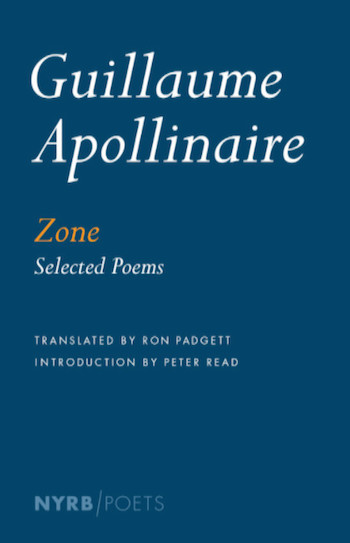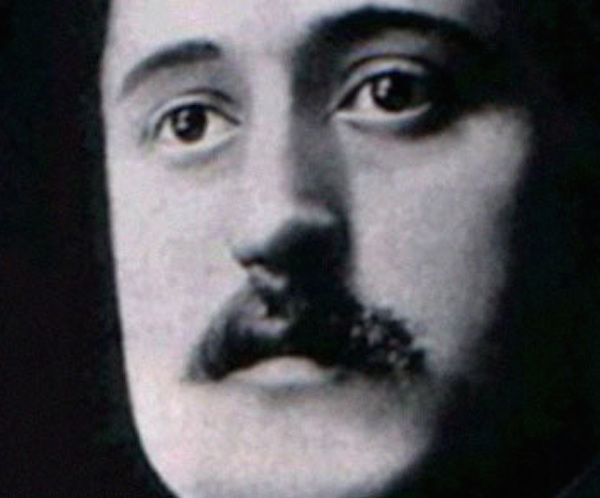Poetry Review: “Zone: Selected Poems” — Reproducing the Music of Guillaume Apollinaire
By John Taylor
Whenever a choice needs to be made between meaning and melody, translator Ron Padgett tends to opt for the latter, successfully bringing out as much of Apollinaire’s music as possible.
Zone: Selected Poems by Guillaume Apollinaire, translated by Ron Padgett. New York Review Books, 254 pp., $16.

In the French provincial town where I have long lived, I was involved for a while in an educational program designed to bring reading and writing into the juvenile delinquent wing of the local prison. Nearly all the young offenders came from impoverished families, many from broken families, and most had experienced repeated failures at school.
My hypothesis upon embarking upon this project was that the greater the hardship and despair known by the boy, the greater the literature that should given to him. But in small doses: a line or two from Racine or Rimbaud, a short paragraph from Balzac, sentences gleaned from the novels of contemporary writers such as Patrick Modiano, Pierre Michon, Marguerite Duras, Louis Calaferte, and many others.
Of the dozens of authors whom I tried out on the boys, the poet of the following lines was always a big hit:
Ta vie que tu bois comme une eau-de-vie.
Have you recognized the particular lyricism of Guillaume Apollinaire (1880-1918)? Here’s the poet Ron Padgett’s version of the same lines:
Your spirit you drink down like spirits.
Note the French pun on “vie” (life), perceptively translated here as “spirit.” In French, this is the pun to which my class of juvenile delinquents heartily responded. You literally drink down your life as if it were a “water-of-life,” which means “hard alcohol.” And Padgett makes his own pun with “spirit” and “spirits.”
Padgett has translated forty-seven poems by Apollinaire for this handy bilingual Selected Poems, which, moreover, is excellently introduced both by the translator and by Peter Read. The collection opens with the famous title poem, “Zone” (1913), from which the above lines are drawn. My class of juvenile delinquents often wanted more lines from this poem, so deeply did the initial sample affect them. Yet none of them knew that the poet, like them, had also known prison life. Apollinaire was indeed arrested, in September 1911, for complicity in a theft of the Mona Lisa from the Louvre and subsequently spent five days in La Santé Prison, only to be released and later acquitted for lack of evidence. Padgett has translated the six-part poem, “In La Santé,” which Apollinaire wrote during his imprisonment.
This prison parallel aside, my students were especially moved by “Zone” because Apollinaire wrote so truly about life outside the prison. I would inevitably give my students these additional lines (in French, of course) from the poem and we would talk about them:
Herds of buses drive pas mooing loud
Your throat is gripped with love’s pain
As if you should never be loved again
If you lived in the past you’d enter a monastery
You’re ashamed to catch yourself saying a prayer
You jeer at yourself and your laughter crackles like hellfire. . .
In the history of French poetry, this great long poem is at once a culmination and an announcement. It is a culmination because it embraces Baudelaire’s fascination for the modern city; and it equally assimilates the spirit of Rimbaud, who was ever hitting the road—as Apollinaire himself does here, leaving his home in the Parisian suburb of Auteuil and walking into central Paris and then back again, as Padgett explains in his copious and often illuminating endnotes.
The translator points out that the title might refer “to a very poor area on the western edge of Paris” or, alternatively, “to a region in the Jura mountains that Apollinaire visited at a time when he had just finished a poem called ‘Cri,’ which he retitled ‘Zone.’” Given the urban setting of the poem, the former hypothesis is much more likely. In contemporary French, the word continues to mean an impoverished, dangerous urban district.
Taking off from all that he had gathered from Baudelaire and Rimbaud, Apollinaire opened out the potential subject matter of poetry to all sorts of details, odd and ordinary, in the vast chaotic modern world. In “Zone,” he notably recalls significant but also banal moments of his escapades across Europe. The precious short-lived freedom, the insouciance, but also the heightened awareness that he experienced while staying in foreign towns struck a chord with my class of juvenile delinquents. Many of them related Apollinaire’s recollections to the happenstances of their own flights from parents (and, surely, from the police):
Up to Hradčany and through the evening
Hearing them singing Czech songs in the taverns
Here you are in Marseilles among the watermelons
Here you are in Coblenz at the Hotel Gnome
Here you are sitting under a Japanese loquat tree in Rome
Here you are in Amsterdam with a girl that you find beautiful and who is a hag
(. . .)
You go before the examining magistrate in Paris
Like a criminal you are placed under arrest
Your travels were both sad and spectacular
Apollinaire’s poem is also a culmination and an announcement, indeed an encouragement, in that this master of classical French prosody, now eliminating punctuation and transitions and varying the length of his lines, boldly shows how French verse can develop in ever freer ways. And it did. From this formal standpoint, “Zone” is more innovative and expansive than his equally famous poem, “Le Pont Mirabeau,” which is also rendered by Padgett. Published in Alcools (1913) alongside “Zone,” it is considered one of the most sonorously beautiful French poems. Here are the first and the final strophes, as well as the proverbial two-line refrain that is repeated four times:
And our loves
Must I remember them again
Joy is always used to follow pain Let the hour chime the light wane
The days go away I remain(. . .)
Days and weeks drift past like rain
Neither time past
Nor our loves come back again
Beneath the Pont Mirabeau flows the Seine. . .
This brings me to the translation. In French, it is not raining in the last stanza: “Passent les jours et passent les semaines / Ni temps passé / Ni les amours reviennent / Sous le pont Mirabeau coule la Seine.” The “rain” in the translation of course supplies Padgett with a rhyme with “again” and “Seine” (depending on one’s pronunciation), and the rhyming echo with the “wane” / “remain” of the refrain. Apollinaire’s music is quite aptly reproduced.

Guillaume Apollinaire — he opened out the potential subject matter of poetry to all sorts of details, odd and ordinary, in the vast chaotic modern world. Photo: Poetry Foundation.
This translation strategy is applied rather often elsewhere. In another well-known piece, “La Chanson du mal aimé” (“The Song of the Badly Loved”), for example, Padgett uses a “dirt” missing in the French original to get a half-rhyme with “dark” and “heart” and thus reproduce the rather similar rhyme scheme in French, which brings together “Londres,” “rencontre”, and “honte”:
In London in the half-foggy dark
I came across a thug who looked
Like the girl forever in my heart
He shot me such a look
That I looked down ashamed and felt like dirt.
Un soir de demi-brume à Londres
Un voyou qui ressemblait à
Mon amour vint à ma rencontre
Et le regard qu’il me jeta
Me fit baisser les yeux de honte.
Of course, it can be argued that the colloquial “felt like dirt” is an equivalent of the standard French word “honte” (shame). But different levels of diction are involved and, perhaps even more significantly, the respective ways by which the real world is perceived and enters into language. Padgett’s version sometimes strikes me as more concrete, down to brass tacks as it were, than the French original—and Apollinaire was the realist who, via such poems as “Zone,” overturned the predominance of Symbolism. Note as well that the “mal aimé” in the French title is in the singular (it’s the poet who is lamenting his requited love for an English girl), whereas the American title suggests a plural. Such shifts can be justified, I know, as not being shifts. This “mal aimé” is also universal and thus plural.
Similarly, in the same poem, there is no “kiss”—alas, one might say—and, arguably, no “gaslights” but only implied “lit windows” in French lines (“Au tournant d’une rue brûlant / De tous les feux de ses façades”) that are rendered as “At a streetcorner burning like a kiss / With gaslights bright along its walls.” Inventive translation once again allows Padgett to parallel the French rhyme scheme “brûlant” / “sanguinolent” / “ressemblant” with “kiss” / “mist” / “missed.”
I won’t prolong this meticulous comparison, which is not a critique but rather only a caveat to the reader, without French, who might hope to delve more literally into the semantics of what Apollinaire actually wrote. Padgett takes liberties, but he has given deep thought to them and he offers, in his introduction, a detailed discussion of the challenges that he has faced in the fifty-odd years that he has devoted to this project. Whenever a choice needs to be made between meaning and melody, he tends to opt for the latter, successfully bringing out as much of Apollinaire’s music as possible. And the French poet rightfully remains much admired for that as well.
John Taylor’s translation of José-Flore Tappy’s poems, Sheds: Collected Poems 1983-2013 (Bitter Oleander Press), was a finalist for the 2015 National Translation Award. In 2013, he was awarded the Raiziss-de Palchi Translation Fellowship from the Academy of American Poets for his project to translate the Italian poet Lorenzo Calogero—a book that has now appeared as An Orchid Shining in the Hand: Selected Poems 1932-1960 (Chelsea Editions). He has also translated books by Philippe Jaccottet, Jacques Dupin, Pierre-Albert Jourdan, Georges Perros, and Louis Calaferte. He is the author of the three-volume essay collection, Paths to Contemporary French Literature (Transaction Publishers). His latest personal book is If Night is Falling (Bitter Oleander Press).
Tagged: Guillaume Apollinaire, New York Review Books, Ron Padgett
